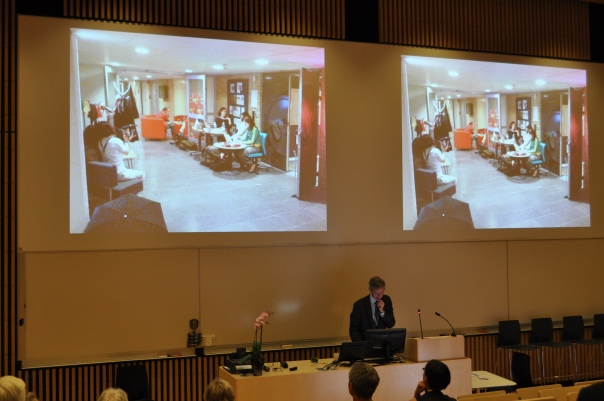Contemporary challenges require inclusively integrated approaches to designing. Constrained by established modes of practice, such integration is impossible without a radical commitment to openness. In response to this need, CAADRIA 2013 invites contributions that engage with open systems in all aspects of architectural and urban design: open with respect to the scale of the design objectives and the context, from a building component within a building system to a neighbourhood or city within its urban and rural context; open with respect to the domains being considered, from planning to sustainable performance of a building or city; open with respect to the collaboration of disciplines and participants, from ad-hoc brainstorming to a rigorous process of consultation and feedback; open with respect to design methods and techniques, from physical modelling to digital prototyping; open with respect to design models and representations being adopted, from a parametric exploration to an ontological delineation considering Building Information Modelling, Built Environment Modelling or City Information Modelling; open with respect to the tools and applications being adopted, despite interoperability issues, from modelling to simulation and assessment; open with respect to the learning approach being adopted, from informal interaction and sharing to formal design education; open with respect to the open source approach being adopted in research and development, in order to gather community involvement and use.
By focusing on the theme of Open Systems, CAADRIA 2013 aims to explore all these aspects and more, and raise awareness to the need of overstepping disciplinary boundaries and reaching creative communities at all levels of expertise, by pooling resources, knowledge and practices, and integrating them through the adoption of open systems.
CAADRIA 2013 invites submissions of original research papers on topics in computational architectural design research, including but not limited to the following subjects:
· Computational design research and education
· Modes of production
· Digital fabrication and construction
· New design concepts and strategies
· Mass customization
· Collaborative design
· Digital aids to design creativity
· User participation in design
· Generative, parametric and evolutionary design
· Virtual architecture
· Shape studies
· Virtual reality and interactive environments
· Precedence and prototypes
· Ubiquitous and mobile design computing
· Design tool development
· Human-Computer Interaction
· Simulation, prediction, and evaluation
· City modelling
· Practice-based and interdisciplinary computational design research
· Theory, philosophy and methodology of computational design research
CAADRIA 2013 also invites submissions of practice work in the form of a poster + abstract (deadline: December 1, 2012). A special conference session on Open Systems in Practice will be dedicated to these presentations. Accepted submissions will also be included in the conference proceedings.
Young researchers currently involved in postgraduate studies are invited to apply for the Young CAADRIA Award and to submit their research-in-progress to the CAADRIA 2013 Postgraduate Student Consortium.
Important Dates
· Abstract submission deadline: September 9, 2012
· Notification of abstract acceptance: October 1, 2012
· Full paper submission deadline: December 1, 2012
· Presentation submission deadline: December 1, 2012
· Postgraduate Student Consortium submission: December 1, 2012
· Young CAADRIA Award submission: December 1, 2012
· Notification of paper acceptance: January 15, 2013
· Notification of presentations acceptance: January 15, 2013
· Registration deadline: February 1, 2013
· Camera ready paper submission: February 15, 2013
· Camera ready presentation submission: February 15, 2013
CAADRIA 2013 Organising Committee-National University of Singapore
Conference Chair: Tan Beng Kiang
Vice Chair: Patrick Janssen
Rudi Stouffs
Shinya Okuda
Huang Yi Chun
Dorothy Man Mai Ling
Contact: caadria2013



